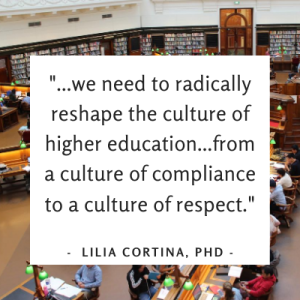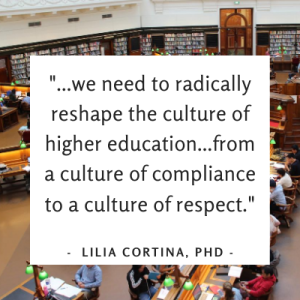Calling for a Radical Redesign of Antiharassment Efforts in Higher Ed


In an opinion piece published in the Proceedings of the National Academy of Science, Anna Kirkland, Director of the Institute for Research on Women and Gender and Professor of Women’s and Gender Studies, Lilia Cortina, Professor of Psychology and Women’s and Gender Studies, and Kathryn B.H. Clancy of the University of Illinois called on colleges and universities to demonstrate “institutional courage” and take immediate, evidence-based steps toward addressing sexual harassment on campus.
As members of the National Academies of Sciences, Engineering, and Medicine committee that coauthored a 2018 report on the prevalence of sexual harassment in higher education, Cortina, Kirkland, and Clancy argue that institutional responses over-sexualize the problem and rely too heavily on fast fixes and legal compliance. "Given the alarming incidence and impact of sexual harassment, there's a pressing need for effective solutions. Over the last few decades, universities across the country have bolstered their anti-harassment policies, built out their harassment reporting systems, and brought in all manner of training to address sexual harassment. But the science is clear: these things don't do much. There is no evidence that rates of sexual harassment have undergone any radical decline,” says Cortina, who was also recently recognized by the National Academies for her work. “If we want to make a dent in this problem, we need to radically reshape the culture of higher education. Move from a culture of compliance to a culture of respect."
Cultural change is attainable. The authors point to specific recommendations to incentivize respectful conduct and improve university climate. Academic leaders can seek out trainings that are grounded in research, led by a “live” instructor, and customized to the particular audience. Importantly, the authors push against the notion of sexual harassment as perpetrated by a few “bad apples” to be rooted out through more reporting. Rather, they argue, “we should prevent sexual harassment by overhauling the structures of power that support it. By hiring more women and gender diverse people, promoting them, and integrating them into every discipline and every level of our institutions. And then transform those institutions into spaces where all genders share power, authority, and respect.”
"Researchers based at IRWG have been working on the thorny problems of sexual harassment and gender-based violence for a long time,” notes Kirkland. The Initiative on Gender Based Violence and Sexual Harassment at IRWG coalesced out of a desire to better understand the enduring problem of gender-based violence in multiple contexts. “We will continue to advance research agendas on these critical topics even under difficult conditions, because they certainly aren't going away."
